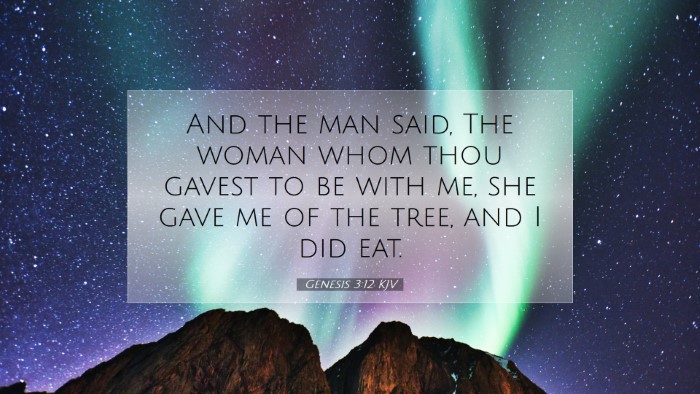Commentary on Genesis 3:12
Genesis 3:12 presents a pivotal moment in the biblical narrative, revealing the consequences of the Fall. In this verse, Adam addresses God after the sin of eating from the forbidden tree, stating: "The woman whom You gave to be with me, she gave me of the tree, and I ate." This text serves as a lens through which to examine human nature, responsibility, and the dynamics of sin.
Contextual Analysis
To fully grasp the significance of Adam's response, we must consider the broader context of Genesis 3. The chapter details the temptation by the serpent, the act of disobedience, and the immediate repercussions of sin. Adam’s words encapsulate a profound shift in relational dynamics, both with God and among humanity.
The Nature of Blame
Adam’s statement can be seen as the first recorded instance of human blame. Here, he points to Eve as the source of his sin, signifying a departure from taking personal responsibility. Matthew Henry notes:
"Adam was not only in the fault, but he attempts to shift the blame to the woman. This tendency to blame others illustrates the fallen human nature."
Insights from Commentators
Matthew Henry
Henry emphasizes the significance of Adam’s abdication of responsibility in his commentary:
"In this we see the miserable effect of sin. When we disobey God, we seek to blame others rather than confess our own shortcomings. This behavior only deepens our alienation from God."
Albert Barnes
Barnes provides a theological insight into sin’s impact on relationships:
"Adam's language reveals not just an attempt to escape guilt, but also an alteration in human relationships. He suggests that the very gift of the woman has become the cause of his downfall, highlighting a tragic irony."
Adam Clarke
Clarke delves into the psychological implications of Adam's assertion:
"This moment showcases the profound sense of shame that envelops Adam. Rather than embracing his own decision, he distances himself from the consequences by implicating another."
Theological Reflections
The blame dynamic presented by Adam signifies a significant aspect of human sinfulness. Theological traditions highlight that this moment reflects a deeper reality concerning human nature:
- Original Sin: This event is foundational in the doctrine of original sin, illustrating how the Fall impacts all humanity.
- Responsibility: Adam's reaction prompts a reflection on personal responsibility and the tendency to evade accountability.
- Interpersonal Relationships: Sin disrupts relationships, causing mistrust and blame, essential themes echoed throughout the Scriptures.
Practical Implications
For pastors, students, and scholars, Genesis 3:12 should invoke several practical considerations:
- Self-Examination: Individuals are encouraged to examine their own lives for instances where they might shift blame instead of owning their conduct.
- Restoration: The need for reconciliation is emphasized; understanding the effects of sin helps promote healing in broken relationships.
- Pastoral Care: Leaders should cultivate an environment that fosters confession and accountability rather than blame-shifting, pointing to Christ as the source of forgiveness.
Conclusion
Genesis 3:12 invites profound reflection on the nature of sin, the dynamics of blame, and the human condition in relationship to God and one another. The commentary from notable theologians like Matthew Henry, Albert Barnes, and Adam Clarke enriches our understanding of this text, providing valuable insights for modern application. In a world rife with blame and division, this passage challenges us to take responsibility for our actions, seek reconciliation, and recognize our need for divine grace.


